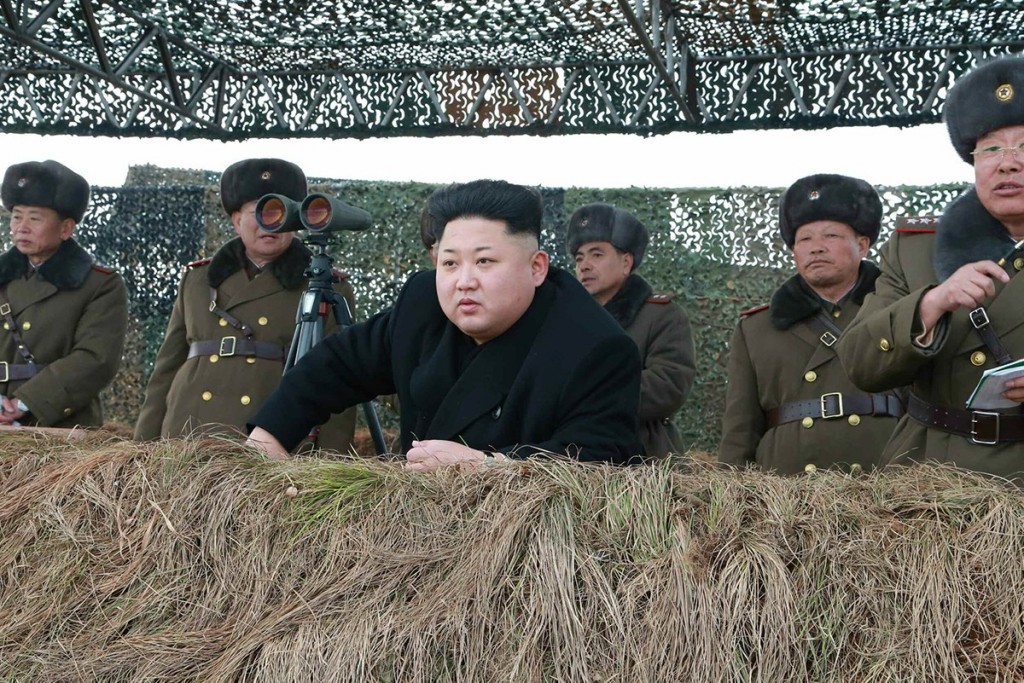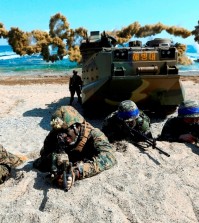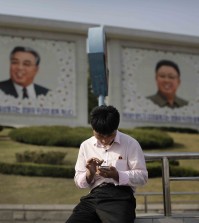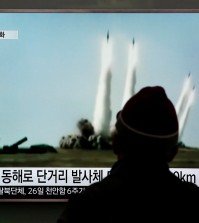- California Assembly OKs highest minimum wage in nation
- S. Korea unveils first graphic cigarette warnings
- US joins with South Korea, Japan in bid to deter North Korea
- LPGA golfer Chun In-gee finally back in action
- S. Korea won’t be top seed in final World Cup qualification round
- US men’s soccer misses 2nd straight Olympics
- US back on track in qualifying with 4-0 win over Guatemala
- High-intensity workout injuries spawn cottage industry
- CDC expands range of Zika mosquitoes into parts of Northeast
- Who knew? ‘The Walking Dead’ is helping families connect
Kim Jong-un has yet to consolidate power, could be marginalized into ‘puppet’: US expert

This Rodong Sinmun photo released on Jan. 27, 2015, shows North Korean leader Kim Jong-un observing the military’s river crossing training. (Yonhap)
WASHINGTON, April 13 (Yonhap) — North Korean leader Kim Jong-un has not fully consolidated his power and could be marginalized into a “puppet” unless he brings in more money and buys support from within the regime in a couple of years, a U.S. expert said Monday.
That is why Pyongyang is largely maintaining its charm offensive toward South Korea while refraining from major provocations in an attempt to prod Seoul to improve inter-Korean relations and “open up the coffers,” said Ken Gause, a top North Korea expert at CNA Corp., during a lecture.
“The royal economy, which is part of the economy surrounding the Kim family, is losing money. They can’t bring in as much money. He’s having to spend about twice as much money than his father did to buy support within the regime,” Gause said. “He doesn’t have the resources to be able to consolidate his power and buy relationships.”
Power struggles, which have been frozen in place since Kim’s execution of his uncle Jang Song-thaek, could thaw out in one to two years, and if those power struggles happen, Kim no longer has the regent structure around to protect him, the expert said.
“He is now directly exposed to those power struggles and he can be undermined by that. Not toppled, not coup, but marginalized and turned into a puppet. I think that would happen within the next two to five years. I really think he needs to do this within the next couple of years,” Gause said.
The economic problem is one of three things Kim must address to consolidate the power he inherited from his father, Kim Jong-il, who died in late 2011, the expert said. The two other tasks are to purge potential adversaries and bring in people and to make progress in defense systems, such as the missile and nuclear programs.
The economic question is why North Korea reached out to Japan and Russia, he said.
“A part of why they reached out to Japan was to put pressure on South Korea. It’s all about South Korea. That’s why they’re playing ball with the Russians right now,” he said. “It’s all getting South Korea to open up the coffers. That’s what it’s about.”
The economic reason also explains why the North hasn’t launched another provocation, Gause said.
“They don’t want to undermine the charm campaign. There’s still, if you read their rhetoric, if you read the media, it does suggest that even though they’re talking a harsh language towards the South Koreans, they’re keeping the door open for potential engagement,” he said.
“If they go and test a missile and especially if they test a nuke, that’s going to really undermine that, especially if they return to something like Cheonan, or whatever. It’s game over at that point,” he said, referring to the North’s 2010 sinking of the South Korean warship Cheonan.
However, if the North makes a determination at some point in the near future that South Korea is not going to play ball, the North may become much more aggressive in terms of provocations, he said.
Should the North’s young leader visit Moscow next month for celebrations marking the 70th anniversary of the Soviet Union’s victory in World War II, it would suggest there’s “stability inside the regime, that he can leave the country,” the expert said.
Another factor that should be watched closely is whether Kim’s second child is a girl or boy, Gause said. Kim’s first child is a girl.
“If it’s a girl and Kim Jong-un were to die or become incapacitated, then you’ve got a major transfer of power issue,” he said, raising the possibilities that Kim’s brother, Jong-chol, could take over or the North could establish collective leadership.
















